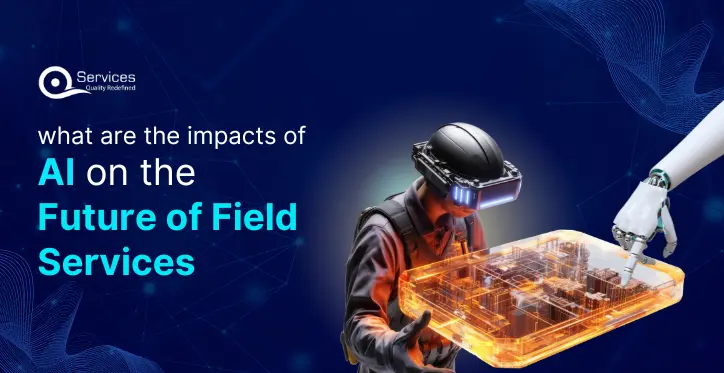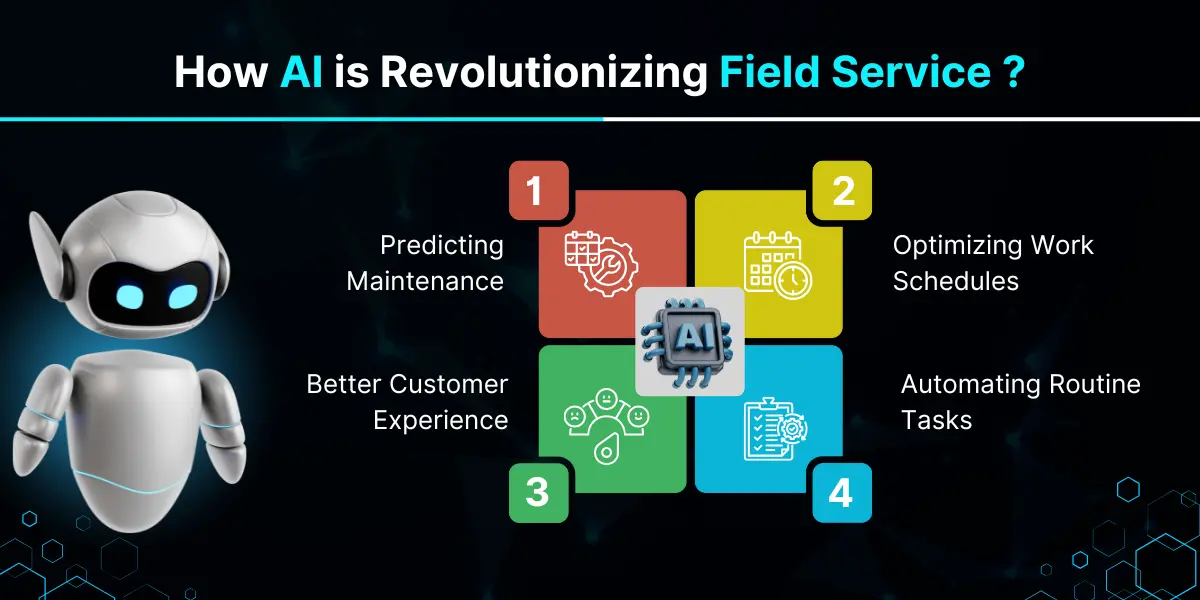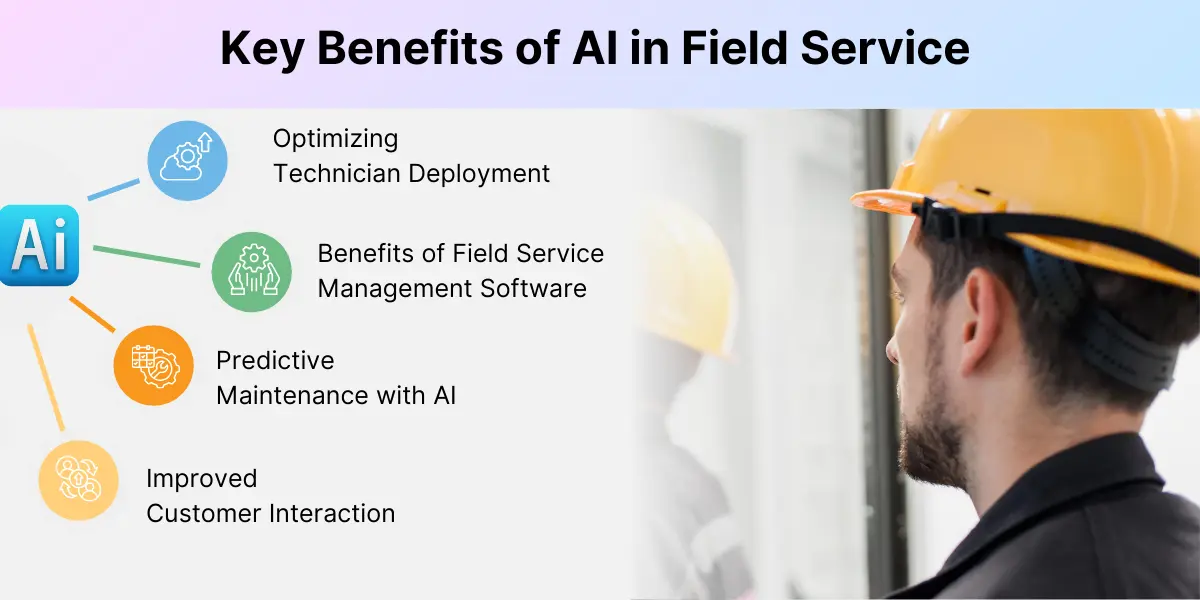
Home » What Are the Impacts of AI on the Future of Field Services

 AI is changing the game for field service companies, helping them work smarter, faster, and with fewer mistakes. Here’s how:
AI is changing the game for field service companies, helping them work smarter, faster, and with fewer mistakes. Here’s how:

Get free Consultation and let us know your project idea to turn into an amazing digital product.
 As the world continues to evolve, so does the role of artificial intelligence in field service. The future is looking bright, With AI-powered tools, field service operations will become smarter and more agile. Predictive maintenancewill help businesses stay ahead of problems, while more advanced AI algorithms ensure that the right resources are always in the right place at the right time. As the technology evolves, the benefits for both service providers and customers will grow exponentially.
As the world continues to evolve, so does the role of artificial intelligence in field service. The future is looking bright, With AI-powered tools, field service operations will become smarter and more agile. Predictive maintenancewill help businesses stay ahead of problems, while more advanced AI algorithms ensure that the right resources are always in the right place at the right time. As the technology evolves, the benefits for both service providers and customers will grow exponentially.

Using AI in field service management can be a game-changer, but to truly benefit from it, businesses need to follow a well-thought-out approach. Here’s how you can make it work for your company:
Look at what’s slowing your field operations. Are your schedules messy? Are technicians overwhelmed with too many calls? Do you face frequent equipment failures?
Decide what you want AI to help with—whether that’s reducing customer wait times, cutting costs, or making technicians’ jobs easier.
Focus on the most impactful areas first. For example, predictive maintenance, smarter scheduling, or better customer communication.
Partner with companies that understand your business and have helped similar organizations.
Make sure the AI can connect with the systems you already use, like your scheduling software.
Pick something that grows with your business and can handle more technicians or customers as your operations expand.
Look for a provider that offers help when you need it—whether it’s fixing issues or updating the AI software.
Ensure the provider has a plan to train your staff so they feel confident using the tools from day one.
Examples of how AI is already working wonders for businesses:
Spot areas where automation will save the most time, such as scheduling or tracking repairs.
Focus on one task first—like predicting equipment issues—before expanding.
Write down what you want to achieve with timelines for each step.
Ensure your team has the right tools, budget, and support to make the transition smooth.
Form a group to handle implementation and quickly address any challenges.
When used right, AI can:
Embracing AI in field services is becoming more necessary for a business in order to thrive in a competitive market. Imagine the ability to reduce delays, optimize technician scheduling, and offer faster, more reliable service with just the power of data and smart algorithms.
AI is making this possible by analyzing real-time data—like traffic, technician availability, and job urgency—to ensure technicians are dispatched to the right place at the right time. This not only speeds up service delivery but also helps businesses cut costs by reducing travel times and improving resource management (Forrester, Accenture). So, let’s embrace AI for betterment of Field Services.

Pipeline failures can be expensive and harmful to the environment. Companies are using IoT applications in the oil and gas industry to prevent these breakdowns and stay ahead of problems.
![Azure IoT vs AWS IoT vs Google IoT Pricing: Feature Comparison Chart for Enterprise [2025]](https://www.qservicesit.com/wp-content/uploads/2025/03/Microsoft-Teams-vs-Slack-vs-Zoom-TCO-Analysis-for-Enterprise-Organizations-2.webp)
The Internet of Things (IoT) helps businesses run better by connecting devices, collecting information, and improving choices. But picking the best IoT cloud provider can be confusing. The main three are AWS IoT vs Azure IoT vs Google IoT.

Field service is nowdays getting a much-needed upgrade, thanks to the integration of IoT and Dynamics 365. No longer are businesses stuck in the old “break-and-fix” cycle. With IoT, equipment now tells you when it’s about to have a problem, and Dynamics 365 takes care of the rest—automating workflows,
AI supports remote diagnostics by analyzing data from IoT sensors and providing real-time insights into equipment performance, allowing technicians to diagnose and fix issues remotely.
AI-powered chatbots handle customer inquiries, provide troubleshooting advice, and schedule service appointments, reducing the workload on human agents and improving response times.
Challenges include integrating AI with legacy systems, ensuring data quality, training employees to use new technologies, and managing the costs associated with AI implementation.
Businesses should evaluate AI providers based on their industry experience, integration capabilities, scalability, support services, and the ability to provide comprehensive training for employees.
Examples include predictive maintenance in utility companies, optimized scheduling in telecommunications firms, and AI-powered customer support in home appliance repair services.
AI enables proactive maintenance by predicting equipment failures before they occur, allowing technicians to perform maintenance tasks during scheduled downtime rather than reacting to unexpected breakdowns.
AI optimizes routes by analyzing real-time traffic data, technician locations, and job priorities, reducing travel time and fuel costs while improving on-time performance.
Future trends include increased use of AI for predictive analytics, augmented reality for remote support, advanced chatbots for customer interaction, and more sophisticated data analysis tools.
AI impacts scalability by providing flexible and adaptable solutions that can handle increased workloads, optimize resource allocation, and support the growth of field service operations.
Key KPIs include reduced downtime, increased first-time fix rates, improved customer satisfaction scores, reduced operational costs, and enhanced technician productivity.

Founder and CEO

Chief Sales Officer
